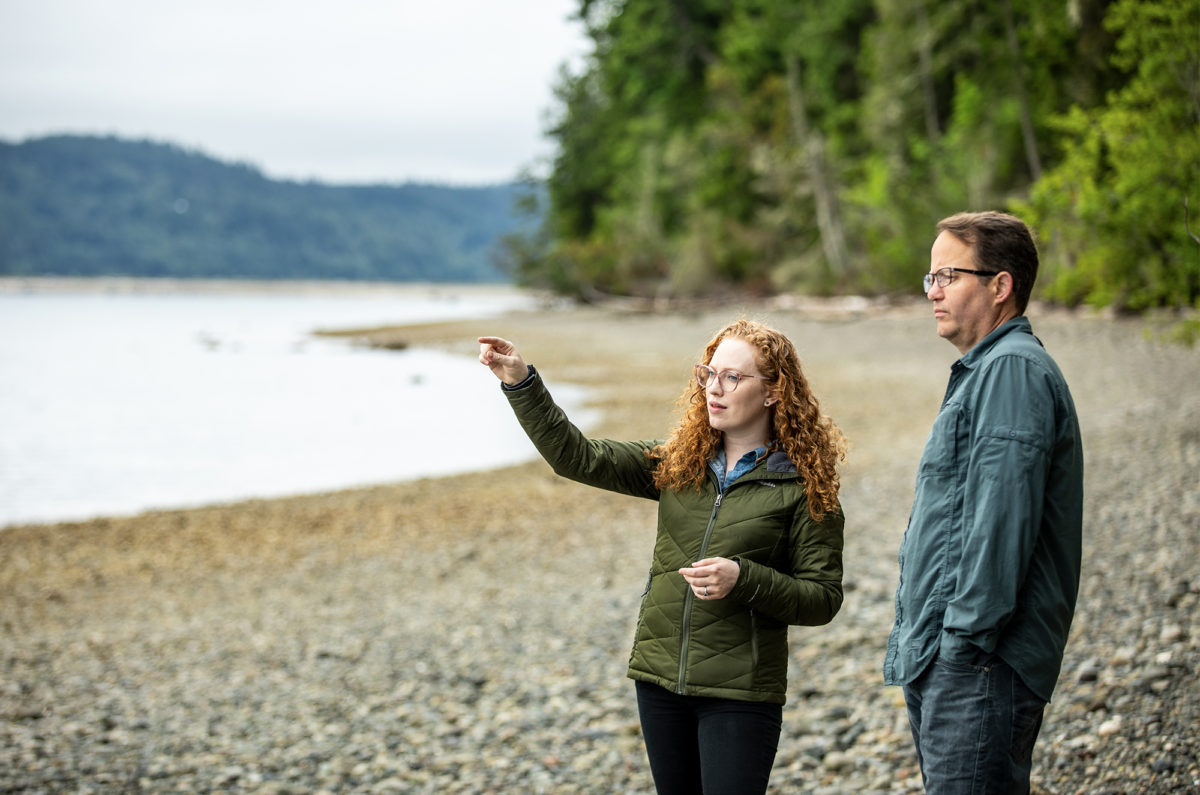On Thursday, April 10th, the UW Center for Urban Horticulture was buzzing with over 100 EarthLab friends, partners, and supporters for the second annual EarthLab Spring Showcase. Across the different backgrounds, disciplines, and experiences of the attendees in the room, the evening was a powerful reminder of the strength we have when we come together in pursuit of climate solutions.
The evening’s programming began with opening remarks from University of Washington and EarthLab leadership. Maya Tolstoy, Dean of the College of the Environment, shared: “There is a unique role for universities to play in our quest to mitigate and adapt to climate change: in research and innovation, teaching, and public service.”

This role is even more urgent now, as environmental research and higher education face growing pressures. As she reminded us, the University of Washington has weathered many storms since its founding in 1861; with continued investment and leadership, we are more than capable of rising to meet today’s challenges.
Stories Shared
The evening featured stories from across our network, like the interdisciplinary team creating a circular economy in South Park, supported by our Innovation Grants Program. This program funds teams that are composed of at least one community partner, two UW faculty members from different departments, and a UW student, to investigate community questions at the intersection of climate change and social justice. To date, this competitive program has received over 160 proposals, and we’ve invested nearly $2 million in 29 dynamic projects.

We also celebrated the success of our Summer Internship Program, which helps UW students from across the tri-campus gain real-world experience in climate careers. With more than 950 applications in just four years for a total of 53 spots, the demand for this kind of opportunity from students is clear and growing.

Behind all of EarthLab’s work is a powerful engine for impact: our shared services model, which supports our own programs while also supporting other environmental research centers we call EarthLab member organizations. More specifically, through our strategic support in administration, HR, operations, and communications, our shared services model has turned EarthLab’s $2.5 million core budget into nearly $35 million in grants and funding—supporting over 120 employees in research and community-engaged initiatives.
We heard firsthand from Rishi Sugla, the co-director of the Northwest Climate Resilience Collaborative based in the Climate Impacts Group (an EarthLab member organization), about the ways that this model has directly supported coalitions of community organizations across the Pacific Northwest advance climate resilience with the most impacted communities at the center of the work.
“When we want to recruit for a pilot educational program that brings together people from different communities, sectors, and disciplines, EarthLab is there to lay the groundwork,” said Sugla. “EarthLab is the connecting thread that brings the best of academic creativity and ingenuity together to be responsive to the real world.”
Thanks To You
As our student speaker, UW junior Cordy Plymale, aptly asked: “If we can’t imagine a better future, how on Earth are we going to get there?” It’s thanks to you — our donors, champions, and partners — we can imagine that better future. And more importantly, we’re building it. Whether it’s breaking down silos between departments, connecting researchers with community needs, or giving students a platform to launch their climate careers, EarthLab is creating space for meaningful, measurable progress.
We’re deeply grateful to those of you who have already invested in this work. Over half of EarthLab’s operating budget comes from philanthropy. As public support becomes increasingly uncertain, private giving is more important than ever.
The potential for more impact is enormous. The need is urgent. And the moment is now. Let’s keep imagining and building that better future together.
To learn more about how your giving to EarthLab programs and researchers could directly drive community impact, please contact Kearstin Williams at kearsw@uw.edu.
